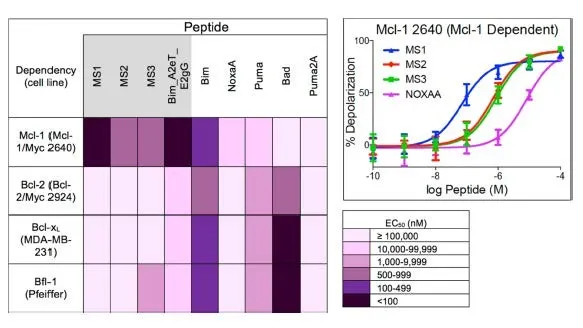Novel Peptidic Agents for Targeting Chemoresistant Anti-Apoptotic Mcl-1
Structurally stabilized Mcl-1-binding peptides may be useful in treating a variety of chemotherapy-resistant cancers such as adult acute myeloid leukemia (AML) and acute lymphoblastic leukemia (ALL).
Researchers
-
selective mcl-1 binding peptides
United States of America | Granted | 11,142,554
Figures
Technology
Mcl-1, along with other members of the Bcl-2 family, blocks apoptosis by binding to short helices in pro-apoptotic proteins, inhibiting their homo-oligomerization and activation. This interaction can be prevented by blocking the binding site on Mcl-1.MS1 is a synthetic peptide that binds Mcl-1 with high affinity and selectively induces mitochondrial permeabilization (MOMP) in Mcl-1-dependent cancer cells. However, as MS1 is a short peptide, it is less stable than a small molecule, unable to penetrate the cell membrane, and susceptible to proteases. MS1 and related peptides that bind Mcl-1 can be stabilized by cross-linking them with hydrocarbon groups optimized to confer protease resistance and enable cellular uptake. This “hydrocarbon stapling” process was used to generate a stapled analog—MS1SAHBc—that exhibits improved binding and helicity, the latter indicative of protease resistance and cell entry capability.
Problem Addressed
Mcl-1 is an oncogene that is overexpressed in many cancers and confers resistance to chemotherapeutic agents. Mcl-1 belongs to a family of anti-apoptotic proteins with homology to B-cell lymphoma 2 (Bcl-2). Inhibition of Mcl-1 and related proteins using potent, selectively binding small molecules is a promising avenue for therapy; however, no such small molecule has been identified for Mcl-1. Synthetic peptides designed to selectively target Mcl-1 are an alternative to small molecules. Such peptides can be structurally modified via “hydrocarbon stapling” to confer stability and promote cell entry, making them candidates for development as cancer therapeutics.
Advantages
- High binding specificity to Mcl-1
- Protease resistant
- Able to pass through the cell membrane
Related Technologies
This case is related to MIT technology: #18162
License this technology
Interested in this technology? Connect with our experienced licensing team to initiate the process.
Sign up for technology updates
Sign up now to receive the latest updates on cutting-edge technologies and innovations.
